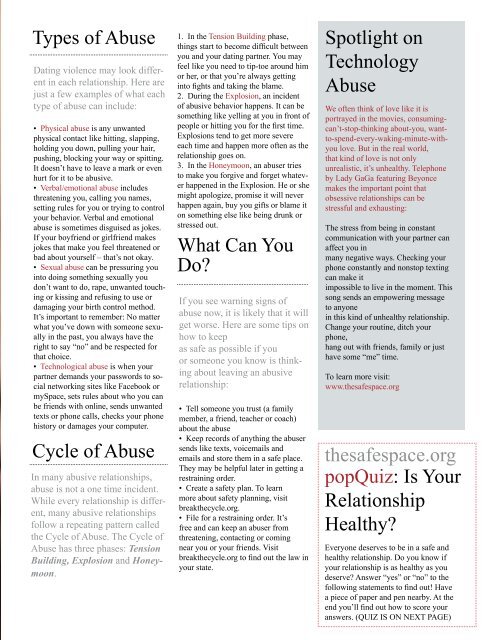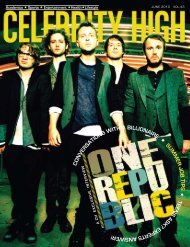SPORTS - Celebrity High Magazine
SPORTS - Celebrity High Magazine
SPORTS - Celebrity High Magazine
You also want an ePaper? Increase the reach of your titles
YUMPU automatically turns print PDFs into web optimized ePapers that Google loves.
Types of Abuse<br />
Dating violence may look different<br />
in each relationship. Here are<br />
just a few examples of what each<br />
type of abuse can include:<br />
• Physical abuse is any unwanted<br />
physical contact like hitting, slapping,<br />
holding you down, pulling your hair,<br />
pushing, blocking your way or spitting.<br />
It doesn’t have to leave a mark or even<br />
hurt for it to be abusive.<br />
• Verbal/emotional abuse includes<br />
threatening you, calling you names,<br />
setting rules for you or trying to control<br />
your behavior. Verbal and emotional<br />
abuse is sometimes disguised as jokes.<br />
If your boyfriend or girlfriend makes<br />
jokes that make you feel threatened or<br />
bad about yourself – that’s not okay.<br />
• Sexual abuse can be pressuring you<br />
into doing something sexually you<br />
don’t want to do, rape, unwanted touching<br />
or kissing and refusing to use or<br />
damaging your birth control method.<br />
It’s important to remember: No matter<br />
what you’ve down with someone sexually<br />
in the past, you always have the<br />
right to say “no” and be respected for<br />
that choice.<br />
• Technological abuse is when your<br />
partner demands your passwords to social<br />
networking sites like Facebook or<br />
mySpace, sets rules about who you can<br />
be friends with online, sends unwanted<br />
texts or phone calls, checks your phone<br />
history or damages your computer.<br />
Cycle of Abuse<br />
In many abusive relationships,<br />
abuse is not a one time incident.<br />
While every relationship is different,<br />
many abusive relationships<br />
follow a repeating pattern called<br />
the Cycle of Abuse. The Cycle of<br />
Abuse has three phases: Tension<br />
Building, Explosion and Honeymoon.<br />
1. In the Tension Building phase,<br />
things start to become difficult between<br />
you and your dating partner. You may<br />
feel like you need to tip-toe around him<br />
or her, or that you’re always getting<br />
into fights and taking the blame.<br />
2. During the Explosion, an incident<br />
of abusive behavior happens. It can be<br />
something like yelling at you in front of<br />
people or hitting you for the first time.<br />
Explosions tend to get more severe<br />
each time and happen more often as the<br />
relationship goes on.<br />
3. In the Honeymoon, an abuser tries<br />
to make you forgive and forget whatever<br />
happened in the Explosion. He or she<br />
might apologize, promise it will never<br />
happen again, buy you gifts or blame it<br />
on something else like being drunk or<br />
stressed out.<br />
What Can You<br />
Do?<br />
If you see warning signs of<br />
abuse now, it is likely that it will<br />
get worse. Here are some tips on<br />
how to keep<br />
as safe as possible if you<br />
or someone you know is thinking<br />
about leaving an abusive<br />
relationship:<br />
• Tell someone you trust (a family<br />
member, a friend, teacher or coach)<br />
about the abuse<br />
• Keep records of anything the abuser<br />
sends like texts, voicemails and<br />
emails and store them in a safe place.<br />
They may be helpful later in getting a<br />
restraining order.<br />
• Create a safety plan. To learn<br />
more about safety planning, visit<br />
breakthecycle.org.<br />
• File for a restraining order. It’s<br />
free and can keep an abuser from<br />
threatening, contacting or coming<br />
near you or your friends. Visit<br />
breakthecycle.org to find out the law in<br />
your state.<br />
Spotlight on<br />
Technology<br />
Abuse<br />
We often think of love like it is<br />
portrayed in the movies, consumingcan’t-stop-thinking<br />
about-you, wantto-spend-every-waking-minute-withyou<br />
love. But in the real world,<br />
that kind of love is not only<br />
unrealistic, it’s unhealthy. Telephone<br />
by Lady GaGa featuring Beyonce<br />
makes the important point that<br />
obsessive relationships can be<br />
stressful and exhausting:<br />
The stress from being in constant<br />
communication with your partner can<br />
affect you in<br />
many negative ways. Checking your<br />
phone constantly and nonstop texting<br />
can make it<br />
impossible to live in the moment. This<br />
song sends an empowering message<br />
to anyone<br />
in this kind of unhealthy relationship.<br />
Change your routine, ditch your<br />
phone,<br />
hang out with friends, family or just<br />
have some “me” time.<br />
To learn more visit:<br />
www.thesafespace.org<br />
thesafespace.org<br />
popQuiz: Is Your<br />
Relationship<br />
Healthy?<br />
Everyone deserves to be in a safe and<br />
healthy relationship. Do you know if<br />
your relationship is as healthy as you<br />
deserve? Answer “yes” or “no” to the<br />
following statements to find out! Have<br />
a piece of paper and pen nearby. At the<br />
end you’ll find out how to score your<br />
answers. (QUIZ IS ON NEXT PAGE)







